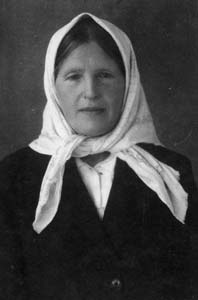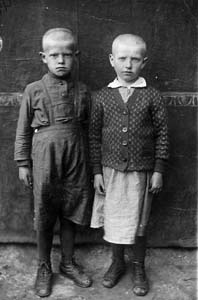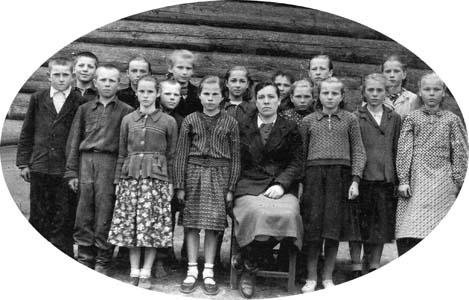

Проект «Голоса еврейских местечек. Могилевская область».פיתוח קשרי התרבות בין העמים של ישראל ובלרוס
|
|---|
Поиск по сайту |
|
MainNew publicationsContactsSite mapVitebsk regionMogilev regionMinsk regionIrina Bainova
|
Victor ArtemievFATE OF THE JEWS FROM THE VILLAGE OF ORDATHistorically it turned out so that in tsarist Russia Jews were allowed to live only in certain provinces, towns and settlements. In Belarus there were a lot of Jews, so the two populations became very close.  Mavra Mitrofanovna Artemieva.
Mavra Mitrofanovna Artemieva.
In the village of Ordat there lived a Jewish family of Girsh Leizarovich. I knew all of their children, who were older than I. When I was five or six (I was born in 1927) my uncle Fedor Glushankov married Berta Leizarovich. Berta was a shop assistant in a local shop. She has a sister, named Basia and a brother. ZalmanHer brother's name was Zalman. He was an excellent blacksmith. He had his own family and a house. Zalman's wife Natalia was Belarusian. He was a tall man, broad-shouldered, always with a kind smile on his face. He never said a bad word to anyone and always fulfilled his promised. In 1941 Zalman was mobilized to the army and did not come back. Chaya and ItzikFedor and Berta did not manage to leave Ordat when the war began. As soon as Germans established their order in Shklov region Berta converted into Christianity and baptized their children, hoping that it would save the family. However, that was only the beginning of a tragedy… Berta and Basia had a cousin, Chaya Leizarovich, who was handicapped. When Germans began shooting Jews, she managed to hide in someone's house in Shklov and then went to Ordat to Berta. Uncle Fedor and his wife Berta only spent the nights in the house. At dawn they had to wake the children and leave to their neighbors. Chaya went to the bathhouse or the basement. My sister secretly brought them food. One day, during one of the Nazi raids Chaya panicked and dashed out of the bath house. The policemen noticed and shot her. Another Berta's relative, Itzik, also lived in Shklov. He managed to escape from Shklov and was hiding the houses of his acquaintances. One day he came to Ordat to see Berta. I do not know how he was caught by the policemen. Later one of the policemen was boasting how he was supposed to take Itzik to the commandant's office: - We were on the bridge across the Dnieper. When we reached the center of the bridge I shouted to him: "Jump into the river, Jew, or I'll shoot you!" He jumped and drowned. Most probably, Itzik jumped into the river by himself, to avoid the gestapo tortures. After the war the policeman was sent into a prison camp and died soon after the release. Berta and FedorAfter the tragedy with Chaya and Itzik life in Ordat became relatively calm until 1942. Thtn they were arrested by a policeman, whose last name was Minin, and taken to the commandant's office in Shklov. However, they were released a few days later. In 1943 Minin again arrived in Ordat. My mother, Mavra Artemiev, told me that they were taken to Gorky. Later we found out that they had not reached Gorky and had been shot in Timokhovka. Fedor had been made to dig out his own grave. Dina and Lenik Lenik and Dina Glushankovs.
Lenik and Dina Glushankovs.
During Fedor and Berta's arrest the policemen did not take their children. Dina was about 12 and Lenik about 10. They lived about two weeks in Radishino and then murderer Minin came to take them away. He took the children to Gorky. Minin was accompanied by his wife, who offered them candy and a blanket. However they refused – they knew who had murdered their parents. They were kept in Gorky for 24 hours and then released. Most probably, Minin's wife insisted on that. The children returned to Radishino only to be arrested again a few days later. They were sent to a concentration camp in Orsha. Our neighbors saw how Dina and Lenik were taken away in a truck to be murdered together with the other camp prisoners… Minin came to our house again, hoping to arrest Basia. Failing to find her, he took some of our belongings. Unfortunately, during the liberation of Belarus Minin was not arrested – he escaped with Germans. Basia Leizarovich Basia Leizarovich with her students, 1957.
Basia Leizarovich with her students, 1957.
Basia continued hiding in different houses. Later she was taken by the partisans and fought against the Nazis. She was the only one who survived the war. After the war she settled down in uncle Fedor's house and worker as a teacher in Ordat school. She died when she was already retired. |
|||
|
|
Jewish settlements in Mogilev regionMogilev• Antonovka• Batsevichi• Belynichi• Belynkovichi• Bobruisk• Byhov• Chausy• Cherikov• Dashkovka• Dribin• Esmony• Glusk• Golovchin• Gorki• Gory• Grozdianka• Hotimsk• Kirovsk• Klichev• Konohovka• Kostukovichi• Krichev• Krucha• Krugloye• Lenino• Lubonichi• Martinovka• Moliatichi• Mstislavl• Naprasnovka• Osipovichi• Rodnia• Rudkovschina• Samotevichi• Sapezhinka• Selets• Shamovo• Shepelevichi• Shklov• Slavgorod• Staroselie• Sukhari• Svisloch• Vereschaki• Zaverezhie• Zhilichi• |
Main |
New publications |
Contacts |
Site map |
Vitebsk region |
Mogilev region |
Minsk region |